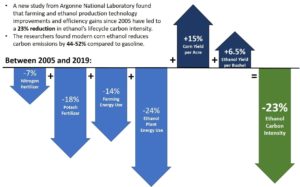A new analysis by scientists at the Department of Energy’s Argonne National Laboratory has determined that the carbon footprint of corn ethanol improved by 23% between 2005 and 2019, and by 2019 was reducing lifecycle greenhouse gas emissions by 44-52% compared to gasoline.
 The research, published in the academic journal Biofuels Bioproducts and Biorefining, also determined that “corn ethanol alone reduced transportation-related GHG emissions by nearly 550 million metric tons between 2005 and 2019.”
The research, published in the academic journal Biofuels Bioproducts and Biorefining, also determined that “corn ethanol alone reduced transportation-related GHG emissions by nearly 550 million metric tons between 2005 and 2019.”
“Our study shows that while the corn ethanol industry has experienced significant volume expansion, it has reduced the GHG intensity of corn ethanol through improved US corn farming and ethanol biorefinery operations. Corn yield has increased, and chemical and energy use intensities of corn farming have decreased. In ethanol biorefineries, ethanol yield has increased, and energy use has decreased significantly,” according to the researchers. “Biofuels, including corn ethanol, can play a critical role in the U.S. desire for deep decarbonization of its economy.”
Renewable Fuels Association president and CEO Geoff Cooper said, “We encourage the White House and Environmental Protection Agency to consider the findings of this study as they examine policy and regulatory opportunities for reducing carbon pollution. We also urge EPA to incorporate the Argonne results and other recent research as the agency considers updating its 12-year old GHG analysis of ethanol and other renewable fuels.”

